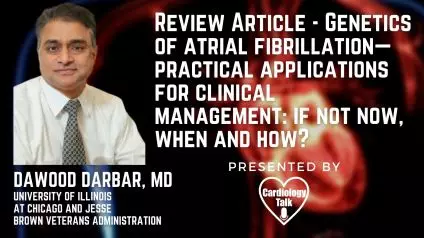Dawood Darbar, MD @thisisUIC @UICnews @uiccom @UIC_Cardiology @ChicagoVAMC #AtrialFribrillation #Cardiology #Research...
Dawood Darbar, MBCHB, MD, FACC, FAHA, FHRS from the Division of Cardiology, Departments of Medicine, the University of Illinois at Chicago and Jesse Brown Veterans Administration speaks about Review Article - Genetics of atrial fibrillation—practical applications for clinical management: if not now, when and how?
Link to Article:
https://academic.oup.com/cardiovascres/article/117/7/1718/6274893
Abstract:
Over the next few decades, the prevalence and economic burden of atrial fibrillation (AF) are expected to more than double. Early and systematic rhythm control therapy, in addition to anticoagulation and treatment of concurrent cardiovascular diseases, lowers cardiovascular outcomes when compared to a rate control strategy, favoring the safe restoration and maintenance of sinus rhythm. Antiarrhythmic medications (AADs) and catheter ablation are two current treatments for AF rhythm management (CA). Individual patient response is very varied, with some patients maintaining AF-free for lengthy periods of time on antiarrhythmic treatment while others need repeat AF ablation within weeks. The lack of effectiveness of rhythm control treatment for AF is due in part to a lack of knowledge of the pathophysiological processes and our inability to anticipate individual patient responses. As a result, determining which patients with AF are likely to react to rhythm management approaches is a huge knowledge gap. With the discovery of uncommon mutations in cardiac ion channels, signaling molecules, and myocardial structural proteins linked with familial (early-onset) AF during the last decade, great progress has been made in characterizing the genetic architecture of AF. Genome-wide association studies, on the other hand, have revealed common variations at over 100 genetic loci, and the creation of polygenic risk scores has identified people at high risk. Although retrospective studies show that common genetic variation influences response to AADs and CA, the creation of a complete clinical and genetic risk score might allow genetic data to be translated into bedside therapy for AF patients. Given the economic implications of the AF pandemic, even minor increases in treatment effectiveness might result in significant benefits for individuals and healthcare systems.




